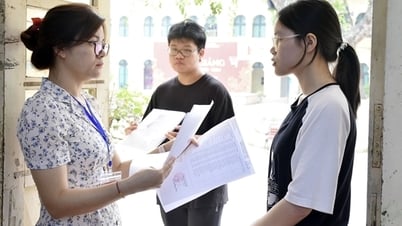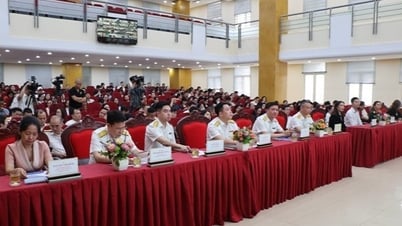The Ministry of Education and Training is seeking comments on a draft Circular regulating rewards and discipline for students. This Circular is expected to replace Circular 08 of 1988 providing guidance on rewards and discipline for students.
The draft stipulates 5 forms of commendation including: Commendation in front of the class; Commendation in front of the whole school; Certificate of merit from the principal; Letter of commendation; Other forms of commendation and rewards.
In particular, the form of praising in front of the class is applied to students with good behavior, having a positive influence on other students in the class or students with remarkable progress in studying and training. Teachers decide and carry out praising students in front of the class at the appropriate time.
Commendation in front of the whole school is given to students with excellent achievements, good behavior, positive influence on other students in the school or students with outstanding achievements in studying and training. The homeroom teacher asks the principal to commend the student in front of the whole school.
The principal's certificate of merit is given to students who have achieved one of the following achievements: achieving achievements according to the regulations on student assessment of the Ministry of Education and Training; having many contributions to the class, school or youth union, team work; actively participating in community activities introduced by the homeroom teacher and recognized by the class; having achievements in emulation movements, competitions, and contests according to regulations.
Letters of commendation are given to students who have improved academic results, training, surpassed themselves or have outstanding achievements. Teachers, principals, and managers at all levels will give letters of commendation to students depending on the nature and level of the achievement.
In addition to the above forms of commendation and reward, agencies, organizations and individuals can implement other appropriate forms of commendation and reward to promptly encourage and set an example for students in their study and training.
For discipline, disciplinary measures for primary school students include: Reminders, requests for apology.
Disciplinary measures for students other than primary school students include: Reminders, criticism, and requests to write self-criticism.
Some of the main support activities to overcome violations are advising and encouraging students to self-aware of violations and how to overcome them; monitoring, advising, and supporting students who violate during the process of overcoming violations; coordinating with students' families and other forces to advise and support students to overcome violations.
The draft Circular clearly states the purpose of preventing, stopping and handling student violations; at the same time educating and helping students to self-aware of violations; voluntarily adjusting their behavior, overcoming consequences, voluntarily cultivating and practicing to progress and forming disciplined habits and lifestyles.
The principles of discipline are respect, tolerance, objectivity, no prejudice, ensuring the right to participate and the interests of students in related issues. Do not use disciplinary measures that are violent, insulting to dignity, or affect the physical and mental health of students.
Source: https://baophapluat.vn/bo-gddt-du-kien-bo-hinh-thuc-dinh-chi-hoc-sinh-post547719.html


![[Photo] General Secretary To Lam begins official visit to Russia and attends the 80th Anniversary of Victory over Fascism](https://vphoto.vietnam.vn/thumb/1200x675/vietnam/resource/IMAGE/2025/5/8/5d2566d7f67d4a1e9b88bc677831ec9d)
![[Photo] President Luong Cuong presents the decision to appoint Deputy Head of the Office of the President](https://vphoto.vietnam.vn/thumb/1200x675/vietnam/resource/IMAGE/2025/5/8/501f8ee192f3476ab9f7579c57b423ad)
![[Photo] National Assembly Chairman Tran Thanh Man chairs the meeting of the Subcommittee on Documents of the First National Assembly Party Congress](https://vphoto.vietnam.vn/thumb/1200x675/vietnam/resource/IMAGE/2025/5/8/72b19a73d94a4affab411fd8c87f4f8d)
![[Photo] General Secretary concludes visit to Azerbaijan, departs for visit to Russian Federation](https://vphoto.vietnam.vn/thumb/1200x675/vietnam/resource/IMAGE/2025/5/8/7a135ad280314b66917ad278ce0e26fa)

![[Photo] Prime Minister Pham Minh Chinh meets with the Policy Advisory Council on Private Economic Development](https://vphoto.vietnam.vn/thumb/1200x675/vietnam/resource/IMAGE/2025/5/8/387da60b85cc489ab2aed8442fc3b14a)

















































![[Photo] Prime Minister Pham Minh Chinh talks on the phone with Singaporean Prime Minister Lawrence Wong](https://vphoto.vietnam.vn/thumb/402x226/vietnam/resource/IMAGE/2025/5/8/e2eab082d9bc4fc4a360b28fa0ab94de)


































Comment (0)